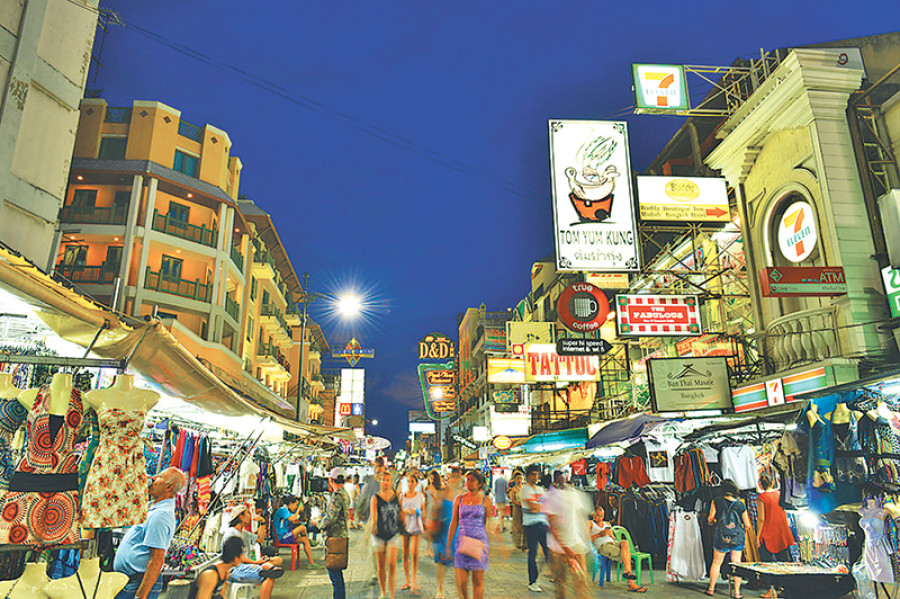Miscellaneous
Notes from khao san
Khao San, one of the oldest streets in Bangkok, is—to a Nepali eye—an amplified version of Thamel. For a price, anything can be made available—from relaxing foot massages, helium gas highs, sultry hookers, deep fried scorpions and cockroaches to carefully manufactured sojourns to hamlets where bewildering traditions are kept alive for tourists. And as the moon climbs in the sky, the street turns into one big party with delirious dancing and drunken debauchery.
Sandesh Ghimire
Khao San, one of the oldest streets in Bangkok, is—to a Nepali eye—an amplified version of Thamel. For a price, anything can be made available—from relaxing foot massages, helium gas highs, sultry hookers, deep fried scorpions and cockroaches to carefully manufactured sojourns to hamlets where bewildering traditions are kept alive for tourists. And as the moon climbs in the sky, the street turns into one big party with delirious dancing and drunken debauchery.
Khao San, it seems, is where tourists and locals come to be free from the moralising gaze of society, inside the comforts of civilisation, but without its shackles. And like everyone else, unhindered by gazes familiar, I had no intention of being a saint there. I bar hopped and drank till the wee hours of the morning. There, I forsook my identity and responsibilities.
One morning, as I limped back to my hotel, I was arrested by a photograph of the Thai monarch, whose eyes seemed to trace my every move. I felt as if I had been suddenly caught by my parents doing something untoward. Even though photos of the Thai royal family are a common sight on billboards and buildings, this sudden confrontation jolted me back to reality. The freedom I had so gleefully celebrated was sanctioned by a military regime, which, in turn, was tacitly supported by the royal family.
I was in Thailand for a short time and so, did not feel the same kind of misgivings that I hold towards Nepal’s own dictators and monarchs. The Ranas and Shahs had lived lavish lives at the expense of others. For centuries, Nepalis had been denied access to fundamental rights such as health and education. Even now, as we ride towards the promised land of prosperity, images of malnutrition make it to the front pages of national dailies.
There is a crucial difference between the authoritarian regime that currently rules in Thailand and those that ruled Nepal in the past. The Thai junta does not deny its people access to schools and hospitals. Despite decades of intermittent military rule, interspersed with moments of democratic uprisings, Thailand has somehow managed to lure hundreds of Burmese of Nepali descent, westerners looking for a retirement home, Nepal’s monarchs and elites going on shopping sprees, Nepal’s politicians seeking treatment for ailments they’d rather not treat at hospitals back home that they themselves underfund and undercut, and people like me, looking to spend some time with a loved one away from prying judgmental gazes.
Authoritarian regimes, it is said, do not provide the right conditions for prosperity or development. But while in Thailand, I began to wonder if it mattered whether or not you had political freedom, if you had the opportunity for a dignified livelihood. China, for instance, does not preach democracy. Yet, since the 90s, more than 400 million Chinese have been lifted out of poverty, according to the World Bank.
In Nepal, ever since the fall of the Ranas in the 50s, we have understood political freedom as a prerequisite for basic rights. But so many Nepalis are continually denied their basic needs. So when I look at the Thai people, I wonder what exactly that they lack?
Something has to have been lost. In an overabundant society, it is easy to get lost among the choices of what is permissible, that it is difficult to see what is not allowed. The Thai people have affluence, but I believe humans need more than wealth to live a good life. That domain might be the final frontier: to understand what political freedom truly means, especially in the face of material opulence.
Back at the portrait of the Thai monarch, I wondered then if it was his stern gaze that prompted this rumination. I didn’t know if I was free then and I don’t know if I am free now. I was drunk and wishing to remain that way, I drifted back into a bar like a boat on a swiftly flowing river, carried on its natural course.




 22.37°C Kathmandu
22.37°C Kathmandu










